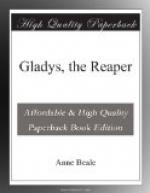’Why, this is Gladys, Mrs Prothero’s Gladys. How could you prevail on her to stand for her picture? Look, Serena, how well Colonel Vaughan has hit off her expression and general effect in those few touches!’
’I went to see Prothero, who used to be a good friend of mine in old times, and whilst I was waiting for him and looking out of the window, I saw this Gladys in the garden, and made the attempt you are pleased to praise. Certainly she is about the loveliest specimen of country beauty I ever saw in my life.’
’Do you admire her, Colonel Vaughan? I think the ith tho very pale and thupid.’
’I never contradict a young lady, and suppose you must be right; but in the present company, one cannot think of other belles. It would be a case of looking for stars in the presence of the sun.’
Colonel Vaughan glanced from one to the other of the ladies. Freda bent more closely over her sketch, but coloured perceptibly. Miss Nugent simpered and looked very handsome withal.
Miss Hall was struck with her beauty as she then appeared; a perfect profile, perfect complexion, perfect features, beneath a most becoming straw hat and feathers. Such a colour and complexion, but no expression, not even the sarcastic turn of the lip of the mother.
‘Perfectly child-like, amiable, and silly,’ thought Miss Hall, ’and yet Colonel Vaughan admires that statue more than the noble face and grand expression of my Freda.’
CHAPTER XXIII.
THE PREACHER.
As Mr Jonathan Prothero’s sprain proved to be a very bad one, Rowland was obliged to undertake his weekly as well as his Sunday duty, and being summoned to the vicarage early on Saturday morning for a wedding, and finding other clerical duty in the afternoon, he had no time to revise his sermon until the morning on which he was to preach it. His mind was still in a state of so much excitement, that he found, on reading it over, that he had no power to amend what he had written hastily, but feeling that it was what he earnestly desired to act up to himself, and to bring his own mind down to, he hoped the words would not be without effect on his hearers. If Miss Gwynne took them as intended personally to touch her, why, he could not help it, and besides, she probably would be at Llanfawr church, to avoid seeing him.
But this was not the case. Gwynnes, Nugents, Protheros, and many others of Rowland’s neighbours, helped to fill the little church that Sunday, all anxious to hear him preach; this made him feel nervous in spite of himself. In vain he reasoned with himself, prayed to forget himself, and those present—he could not get rid of those haunting words of Miss Gwynne’s, or of the consciousness that she was listening to him. However, he read the service clearly and impressively, in the manly tone, and simply religious manner of one who knows that he is leading




